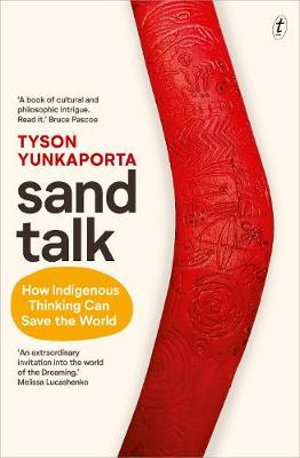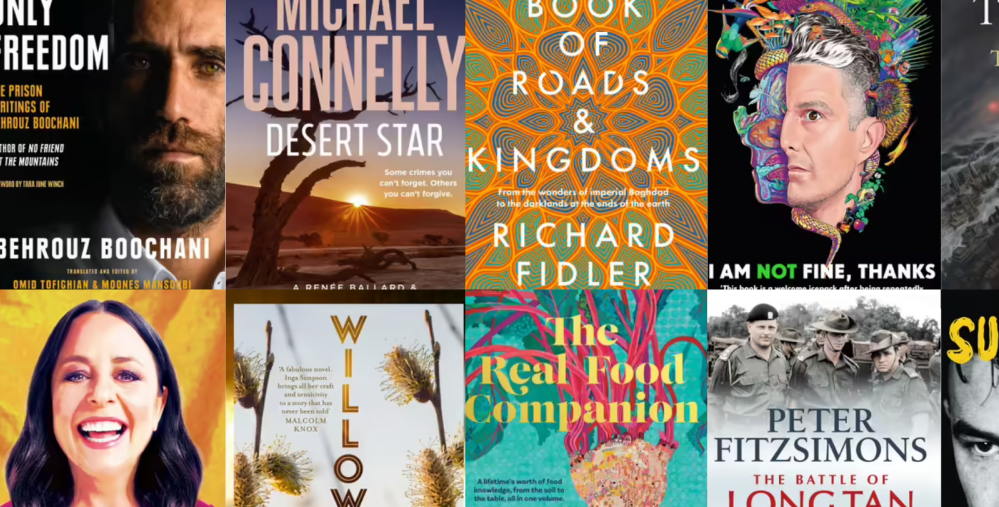Tyson Yunkaporta is an academic, an arts critic, and a researcher who belongs to the Apalech Clan in far north Queensland. He carves traditional tools and weapons and also works as a senior lecturer in Indigenous Knowledges at Deakin University in Melbourne. His new book is Sand Talk, a book about Indigenous thinking and how it can save the world.
Today, he’s on the blog to answer some questions about his new book – scroll down to read what he said!
 Tell us a little about your book, Sand Talk.
Tell us a little about your book, Sand Talk.
TY: It is an adventure into a world of thought experiments conducted by marginal people with unconventional points of view. There is gold to be found at the margins of any society, different ways of thinking that can produce innovative solutions to sustainability issues that we might otherwise miss. The book outlines Indigenous ways of thinking and producing new knowledge through respectful dialogue based on reciprocity rather than competition. It imparts an impression of the pattern of creation and how we might follow that pattern in our lives and systems. It also expands the possibilities of what a book can be…
Sand Talk is described as a guide to how Indigenous thinking can save the world. What are the main differences between Indigenous and non-Indigenous thinking?
TY: The main difference is context. Indigenous thought is highly contextualised and situated in dynamic relationships with people and landscape, considering many variables at once. Non-Indigenous thinking is good at examining things intensively in isolation, but could be enhanced by Indigenous thinking when examining the complex problems the world is facing right now.
If Australia was to take on the principles you describe in Sand Talk, what do you think our society would look like?
TY: For a start there would be a lot less angry people yelling opinions into a void of cyberspace. People would have time to connect and think deeply, grounded in profound relation to the land and adapting to changing environments in cooperative communities. Children would be embedded in community and work spaces rather than locked up during the daylight hours. There would be no struggle for work/life balance, because these things would not be separate domains. Economies would be recession-proof and welfare would be unnecessary because families and communities would be structured to support every person as needed.
What do you hope readers will take away with them after reading Sand Talk?
TY: I hope readers will see their sacred role as custodians of creation, and that each will find their unique way of contributing to the diversity and true sustainability of the complex systems they inhabit. Most of all there is hope for the future to be found in this book, understandings of adaptive ways of thinking and living gleaned over tens of thousands of years of apocalyptic events like rising sea levels and meteor impacts, ways of seeing new beginnings rather than Armageddons and end-times.
How did you approach the writing of this book?
TY: It is an unusual book, because it is a translation of knowledge created by groups of people in oral-culture situations, knowledge that was first carved into traditional objects and then partially transferred into print. The book is offered as a dialogue between these Indigenous thinkers and the reader, a dialogue in which the knowledge, life and even the body of the reader is incorporated into the journey.
As a result, this book will be different for every person who reads it, and they will take away different ideas and actions. In this way, the knowledge will grow exponentially and create a ripple effect in the world. I don’t see this book as being my intellectual property – it is open-source cognitive technology to be used by anyone who wants to make a change in the world and in their lives.
What is the biggest challenge you faced while writing this book?
TY: One big challenge was finding spaces in the city to carve the objects for each chapter without getting arrested. People get twitchy when they see a brown guy with a beard and an axe in civic spaces. I had some very narrow escapes while creating this book!
I guess the biggest challenge though was in questions of authenticity and relevance – people have strong expectations of what an Indigenous person should look like and represent. When you put yourself out there you tend to get challenged on your identity and right to speak at all, by both Indigenous and non-Indigenous people. I am a very marginal person in both my own community and the wider community, so sometimes people get annoyed about my out-of-the-box ideas taking up space in the public domain. I agree with them too – I worry about the possibility of my work taking focus away from people who are senior to me in my culture and who have to fight hard to get their voices heard. I struggle with that a lot, but at the same time I need to put food on the table and this is my only marketable skill.
My hope is that my work will direct people’s attention to the work of Indigenous thinkers and activists who are a lot smarter and respected than me, and whose stories need to be heard. Otherwise I’m just out here making a big mess.
What is the best piece of writing advice you have ever received?
TY: The best advice I had was in a very harsh criticism that I found extremely useful. “Too much technique, not enough craft!” It stopped me from trying to show off my mastery of literary devices and allowed me to let my voice come through.
And finally, what’s up next for you?
TY: I’m currently working on an impossible challenge – a blackfella viking saga. I’m pretty sure that’s never been attempted before, and I’m starting to find out why…
Thanks Tyson!
We have signed copies of Sand Talk available for pre-order – get yours before they sell out!

Sand Talk
What happens when global systems are viewed from an Indigenous perspective? How does it affect the way we see history, money, power and learning? Could it change the world?
This remarkable book is about everything from echidnas to evolution, cosmology to cooking, sex and science and spirits to Schrodinger's cat.
Tyson Yunkaporta looks at global systems from an Indigenous perspective. He asks how contemporary life diverges from the pattern of creation...






 Booktopia’s Best Non-Fiction Books of 2022
Booktopia’s Best Non-Fiction Books of 2022  Top 10 Books for Dad this Christmas!
Top 10 Books for Dad this Christmas!  On The Pod: Lynette Noni, Larry Emdur and Brendan Jones!
On The Pod: Lynette Noni, Larry Emdur and Brendan Jones!
Comments
October 21, 2019 at 2:12 pm
I’m guessing that “blackfella viking saga” might have played out across the region some now refer to as Wallacia sixty thousand years ago, give or take, and Tyson might be the one person broad enough to pick up vital clues from oral histories. Might help to cross fertilise with Tim Flannery’s Future Eaters.